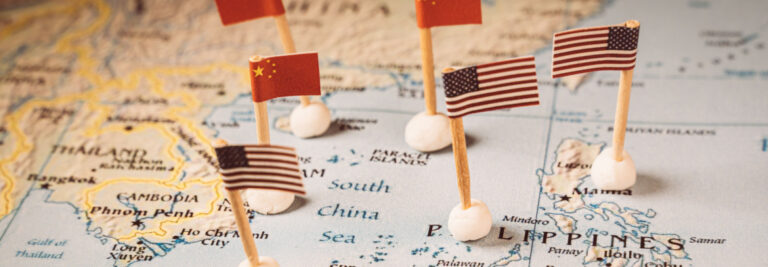Rumors within Taiwan have been plaguing US-Taiwan relations for years. They include falsehoods such as how Taiwan is the US’ chess piece against China; the United States is using Taiwan to force China to make trade concessions to the United States; the United States is forcing Taiwan to waste money to buy US weapons; and that the US military wants to dock in Taiwan’s ports. These ideas distort positive aspects of US-Taiwan cooperation and put them in a negative light. They attribute US assistance toward a valuable partner such as Taiwan falsely, as if driven by selfish US motives to harm or “use” Taiwan.
It is a futile world view. Harming a partner is obviously negative, doing nothing to help is not desirable, yet helping a partner is also portrayed as negative. No type of interaction or even lack of interaction would be considered beneficial from this banal perspective, moreover, nobody wins with this distorted view of US-Taiwan relations. In reality, US assistance to Taiwan is most often based on Taipei’s official requests, not the United States forcing its will on Taiwan. The litmus test for who is using whom is first whether each side can freely choose to enter into cooperation; and second the terms of cooperation. By these standards, the United States is not using Taiwan. Both sides freely choose to cooperate and the terms are based on what is mutually acceptable.
If the United States is Using Taiwan
Newspapers that lean toward supporting Beijing are often more likely to be critical of the US-Taiwan relationship and accuse the United States of taking advantage of Taiwan against Taiwan’s interests. For instance, an article by the Hong Kong-based CRNTT (aka China Review News) mentioned that Tang Yonghong (唐永紅), who is the deputy director of the Taiwan Research Center at Xiamen University in China, claims that “the United States wants the Taiwan chess piece to fight against the Mainland.” Another article by Apple Daily spread the opinion that “Trump is using Taiwan as a pawn to force China to make concessions on US-Taiwan trade, and may eventually sacrifice Taiwan’s interests.”
There are also rumors that the United States wants to use Taiwan’s strategic position in the Pacific to the US’ military advantage. A China Times article by Wang Kunyi (王崑義) argues, “[i]t is impossible [for the United States] to ignore Taiwan’s strategic position, so as the relationship between the United States and Taiwan warms up, the US military wants to dock in Taiwan’s ports.” On the contrary, high-ranking Taiwan military officials state that Taiwan is “actively seeking” exchanges of port calls with the US Navy. However, several of these previously mentioned news sources—CRNTT, Apple Daily, and China Times—can be more critical of the US-Taiwan relationship and they are also more influenced by Beijing than other newspapers in the region.
Indeed, the United States does sell weapons to Taiwan, recognizes Taiwan’s strategic geographical location, and considers naval port visits to Taiwan. However, these aspects of the relationship do not mean that one side is necessarily taking advantage of the other.
If Taiwan is Taking Advantage of the United States
There are also rumors that Taiwan is relying on the United States to protect Taiwan in a possible future conflict against China. The same Xiamen University deputy director cited earlier speculates that Taiwan hopes that military cooperation with the United States will result in the “United States protecting Taiwan,” and claims that Taiwan also “hopes that the United States will recognize Taiwan as a country.” The mention of protecting Taiwan and recognizing it as a country have implications of US confrontation and possible conflict against China.
To be sure, a classic concern among security partners is “entrapment,” which is when one partner drags the other partner into a war. Columbia University Professor and former US State Department Deputy Assistant Secretary Thomas Christensen published a seminal academic article titled “Chain Gangs and Passed Bucks” explaining how security partners are sometimes “free riding on balancing efforts of others.” The implication for Taiwan is to rely on the United States for protection against China. In addition, Georgetown University Professor Victor Cha’s book Powerplay specifically examined Taiwan and concluded that the previous US military alliance with the Republic of China (Taiwan) was based in part on alliance restraint to prevent Chiang Kai-shek from dragging the United States into a war with China. These are proffered up as reasons to be worried that Taiwan could be taking advantage of the United States—which are also not the case.
Indeed, Taiwan needs the United States’ support in case China takes military action against Taiwan. However, Taiwan needing the United States and working with the United States does not mean it is using the United States.
First Criterion: Freedom to Choose
Working with each other and needing each other does not mean that one takes advantage of the other when each side is free to choose other options. Simply, when each side is not coerced to cooperate with one another, then no one is taking advantage of the other.
However, Taiwan is in a unique security situation where it has few alternative choices for advancing its security except for relying on the United States and possibly US allies in the region. Would a close neighbor like the Philippines or Vietnam, Taiwan’s diplomatic allies in Latin America and the Pacific, or Taiwan’s trade partners far away in Europe step in to protect Taiwan? The United States has demonstrated itself to be Taiwan’s closest security partner. Having few other options aside from the United States should make the people in Taiwan value the United States even more. Taiwan needs the United States, but as mentioned earlier, needing a partner does not mean one side is taking advantage of the other.
Second Criterion: Terms of the Deal
The issue of who is using whom is in the terms of agreement, which is mutually negotiated when it comes to the United States and Taiwan. As long as a deal is freely agreed to and not forced, then whether a deal is considered fair depends on the terms of the deal. A useful analogy is buying an item with a certain market rate value. If the buyer overpays by spending several times more than the market rate, then the seller is taking advantage of the buyer. If the buyer underpays by spending a fraction of the market rate, then the buyer is taking advantage of the seller. In the same scenario of buying and selling an item, whether one side is taking advantage of the other depends on whether they can freely agree to a deal versus walk away, and the terms of the deal.
Taiwan’s situation is that it is paying billions of dollars to buy US military equipment, and it has few other options other than the United States since other countries hesitate to sell to Taiwan. Even in this situation, the United States is not taking advantage of Taiwan. It is providing something that Taiwan needs for its own defense, which it would have a hard time buying from others, or it could try to develop on its own. The high cost is a matter of a purchasing power parity difference between the United States and Taiwan where goods and services tend to cost more in the United States than Taiwan—especially the high tech engineering labor hours involved in creating advanced US defense equipment. Taiwan is not paying more than other US customers or even the US military when it buys the same equipment (as a caveat: though prices do not vary between customers, prices do vary between years based on production volume due to the economy of scale). [1]
Rather than one side using the other, both sides benefit from cooperation. In his final analysis, Xiamen University Deputy Director Tang surprisingly concludes that it is not necessarily true that the United States is using Taiwan, or Taiwan is using the United States. To him, military “cooperation between the United States and Taiwan achieves their respective goals.” Bonnie Glaser, who is the director of the China Power Program at the Center for Strategic and International Studies was quoted saying, “US policy makers are not seeking to use Taiwan to increase leverage on China. In response to Beijing’s increased military, political, and economic pressure on Taiwan, the Trump Administration is expressing its support for maintaining the status quo across the Taiwan Strait and for Taiwan’s security.”
These rumors of the US instrumentally using Taiwan are not completely unfounded because there is a deep historical basis from Taiwan’s experience in the 1970s. Taiwan faced an unpleasant surprise nearly five decades ago when Henry Kissinger’s secret talks with China led to the US breaking official relations with the Republic Of China (ROC, or Taiwan) in favor of establishing formal diplomatic relations with the People’s Republic of China. Yet, there is no indication this would occur today again based on current official US government statements in support of Taiwan and indications in key official publications such as the US Department of Defense’s China military power report, the US National Security Strategy, and the US National Defense Strategy.
When using the metrics of whether each side is freely entering into an agreement, and whether the terms of the agreement are standard in interactions with others, it becomes clear that working with one another does not necessarily equal using one another. Scholars, local politicians, and new commentators can scrounge to pull circumstantial evidence to support one’s argument that the United States is using Taiwan, Taiwan is using the United States, or both sides are using each other but this view does not stand up to the two criteria. Furthermore, talk of the United States and Taiwan using one another is unhelpful because it can be a “wedge strategy” that drives both sides apart at a time when they should build trust and cooperation against shared threats.
The main point: News commentators and scholars sometimes paint the US-Taiwan partnership as the United States “using” Taiwan, or vice versa Taiwan “using” the United States. However, a careful examination of the relationship shows that while both sides “need” each other, they each freely choose whether and how to cooperate, and the terms are standard in comparison to the US’ other cooperative partners. Neither side is forced into cooperation, and therefore neither side is using the other.
[1] My earlier Global Taiwan Brief article “Three Myths about US Arms Sales to Taiwan” counter argues against the fallacies that by buying weapons, Taiwan is actually buying insurance to guarantee that the United States would protect Taiwan; US weapons are unfairly expensive; and Taiwan only receives the US’ old and used equipment—all wrong.





